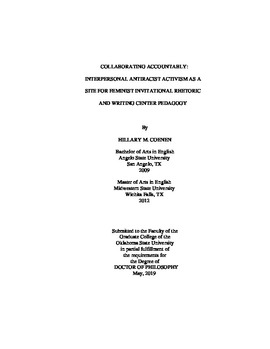| dc.description.abstract | This dissertation applies participatory action research and feminist ethnographic methods to study The Conversation Workshops, which teaches strategies for interpersonal antiracist activism using concepts from invitational rhetoric and writing center pedagogy. The Conversation Workshops are a grassroots project created by the researcher and three collaborators for the Oklahoma City community and piloted, with the support of our writing center, at a university. Data was collected from this pilot to examine the process of collaboratively developing, implementing, and reflecting upon the workshop using the methods of autoethnography (AE) and institutional ethnography (IE), which are combined to produce a critical auto-/institutional ethnography (AIE). Foss and Griffin's concept of feminist invitational rhetoric is central to the workshop curriculum and informs the analysis, and, in addition to the writing center scholarship that undergirded the workshop curriculum, including that of Denny, Condon, Eodice, and Rousculp, the analysis and resulting implications draw upon and contribute to interdisciplinary conversations about collaboration and public pedagogies (Rousculp; Cushman; Grobman; Jackson), critical research methods (Pillow; McKinnon; Patel; Powell and Takayoshi), and pedagogies of antiracism (Ahmed; Green; Martinez; Condon and Young; Carrillo Rowe; Ore; Kristensen; Richardson), decolonization (Tuck and Yang; Grande; Powell; Dutta; Jackson), and whiteness (Applebaum; Lensmire; Bell; Potter). The findings that emerge from the AIE produce an approach called accountable collaboration, which introduces an approach to collaboration rooted in equitable valuation, critical reflexivity, relational equity, and reciprocal trust. With a view to accountable collaboration, this study proposes a vision of collaboration that resists assumptions and invites partnership, one which is based on an invitational model that treats participants more like collaborators than passive audiences. The enactment of these principles with intentionality and a view to inequity can help us reshape and rebuild not only the ways that we work with one another but also the ways that we model accountable collaboration for collaborators and students. | |
